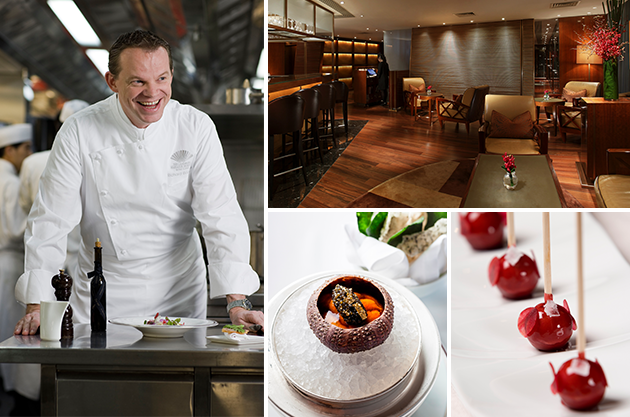
Though Richard Ekkebus grew up in the kitchen of his grandparents’ hotel, the idea of becoming a professional chef didn’t really occur to him until, as a student, he started working weekends as a kitchen porter.
The rest is delicious history: After completing apprenticeships under Dutch masters Hans Snijders and Robert Kranenborg, and garnering early attention as the recipient of the 1990 Golden Chef’s Hat prize for best young chef in Holland, he went to work for Paris superstars Pierre Gagnaire, Guy Savoy and Alain Passard.
His career has taken him to Mauritius, Barbados and now, Hong Kong, where he’s been running Forbes Travel Guide Five-Star The Landmark Mandarin Oriental, Hong Kong’s excellent modern French restaurant Amber since 2005, impressing critics and the crowd with signature dishes like sea urchin with cauliflower and a seaweed “waffle”; amadai with fennel and orange confit, “bottarga” grated new potatoes, bouillabaisse and olive oil emulsion; and for dessert, single-origin chocolate soufflés.
We caught up with chef Ekkebus about Amber, his inspiration and more:
On the particular demands of Hong Kong diners:
“Hong Kong guests are very savvy on the quality of products and particular seafood. People are very sensitive to texture, and the palate is far more delicate, so it is not about bold flavors in Asia. It is all in the finesse. [It’s] so important to consider this in every dish you make, whilst still staying faithful to your vision and maintaining your integrity.”
On seasonal inspiration:
“I am pumped when an ingredient starts [appearing for the season], however, after two months, I really look forward to moving on. The repetitiveness is something you need to manage with discipline. Right now, I am excited about the first cep mushrooms, but trust me, in two months’ time I am anticipating the white Alba truffle and wanting to move away from the porcini.”
On Japanese ingredients and French technique:
“I have, every day, a flight from the north and south of Japan, of seafood, fruits, vegetables and meats that are of the very finest quality possible. I know all my purveyors in Japan personally and we have a close relationship. They understand my needs: If I go to the fish market in Fukuoka, they call me Mr. Amadai. [What’s] important is that we stay very faithful to the French cooking methods and flavor, so [there’s] no miso or wasabi in our food.”
On designing a new dish:
“There is no cookie-cutter approach. We always establish a collection of the ingredients we want to represent in a particular season, and then we start to work layer by layer in order to create a dish we are comfortable with. This can take a few hours and sometimes a few weeks; there are even dishes we have worked on for months and more. We work on this every day of the year — it is constant work-in-progress — but presentation is never the starting point; taste reigns at all times.”
On sourcing ingredients:
“Every time you move, you need to rebuild your framework of reliable sources: People that operate with the same integrity as I have. In Hong Kong, that was also challenging to start with, but today I can say we have the very best sources possibly available. I can also say that from that perspective, Hong Kong has matured with a wealth of better suppliers and more frequent deliveries. These have enabled us to push the boundaries and to constantly improve to strive for the better. Our success is their success.”
On real tomatoes:
“We have started to work on this with some exceptional organic farmers in the New Territories of Hong Kong. A tomato that went through a refrigerator or one that is delivered within one hour of picking is a totally different product. This is highly important in my restaurant; we make sure our guests, especially those of my age or older, remember that this was how a tomato used to taste.”
On the service ethic at the Mandarin Oriental group:
“I am part of a luxury hotel brand that has tremendous focus towards the guest experience. The time we spend in understanding the guests’ needs and being able to anticipate these needs [is something] I have never seen before.”
On the observation that he looks a little like Wolfgang Puck:
“I had hoped you would say Leonardo DiCaprio.”
Photos courtesy of Amber, Landmark Mandarin Oriental

